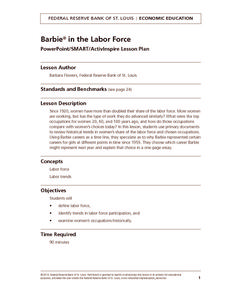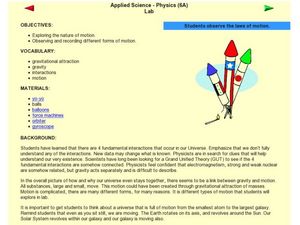Teach Engineering
Fairly Fundamental Facts About Forces and Structures
Don't twist and turn looking for a resource. The first installment of a six-part series teaches young engineers about the five fundamental forces of compression, tension, shear, bending, and torsion. These forces help explain different...
Curated OER
On The Go! Forces and Motion
Students create a car using physics. In this forces and motion lesson plan, students create a car and test which changes in design change the performance of the car. Students complete a graphic organizer with the different...
Curated OER
Move It!!!
Students explore motion by observing the movement of people and duplicating those movements. They compare and contrast various kinds of movements and identify different types of movements in pictures. They build an object that can be...
Teach Engineering
May the Force Be With You: Thrust
Force the plane through the air. The lesson introduces the force on an airplane that makes it go forward. Pupils learn how Newton's laws of motion apply to flight in the eighth segment of a 22-part unit on flight.
Let's Drum!
Let's Drum!
Here's a group of exercises designed to introduce a group or class to the rhythm, as well as the basic sounds of a drum, bass and tone. Individuals investigate different types of drums and form drum circles to practice traditional...
NASA
Soda Straw Rockets
Three, two, one, blast off to a better understanding of force and motion with this exciting science lesson! Beginning with a discussion about rockets and gravity, young scientists go on to complete a series of worksheets about net...
Curated OER
Force and Motion Flip Books
Fourth graders identify six simple machines in real world examples, distinguish between the three different types of levers and explain Newton's three laws of motion. They create a multimedia presentation over the information they've...
Curated OER
Force and Motion
Students experiment with force and motion. In this force and motion lesson, students test gravity using a variety of objects. Students rotate through a series of stations which use force, motion, friction, and inclines. Students predict...
Curated OER
Laws and Force in Law Enforcement
Students investigate the issues of police brutality, use of excessive force, and the underlying issues by participating in a round-table discussion. They compare how these issues are explored differently in different types of...
Curated OER
Rules of Force and Motion
Students view a video and complete experiments with force and motion. In this force and motion lesson, students examine small pieces and how they affect the motion of a toy car. Students also experiment with sand paper,...
Curated OER
Exploring Nature: Powerful Forces
Pupils observe samples of artwork which use line, shape, and form to show movement and depict natural forces of nature. They create their own piece of artwork that shows a natural force and movement and then write a descriptive paragraph...
Kenan Fellows
Analyzing Speed from Different Modalities
Show us your moves. Using sensor equipment, scholars track the motion of different movements, such as jogging, skipping, or jump roping. They analyze velocity and acceleration and create graphs representing each movement.
Federal Reserve Bank
Barbie in the Labor Force
How have the women's share of the labor force and chosen occupations evolved in the United States over the last century? Using census reports, graphs detailing the gender makeup of the labor force, and analysis of the careers of...
Curated OER
Constructive and Destructive forces
Students explore constructive and destructive forces. In this constructive and destructive forces instructional activity, students complete a WebQuest. Students explore the different types of forces and their effect on the surrounding...
Science Matters
Landforms from Volcanoes
Three major types of volcanoes exist: cinder cone, composite/strata, and shield. The 18th instructional activity in a 20-part series covers the various landforms created from volcanoes. Scholars work in pairs to correctly...
Curated OER
Forces and Motion Scavenger Hunt
Students determine how force on an object affects its movement. In this force and motion lesson, students take digital pictures of objects in the school setting that are pushed and pulled. They develop a presentation using the digital...
Cornell University
Bridge Building
Bridge the gaps in your knowledge of bridges. Individuals learn about bridge types by building models. The activity introduces beam bridges, arch bridges, truss bridges, and suspension bridges.
Curated OER
Forces and Graphing
Middle schoolers analyze graphs to determine relationships between variables and rates of change. They determine the basic concepts about static reaction forces. They determine the slope and equation of a line.
Curated OER
Forces and Movement
Students examine types of forces and movements. They identify different causes that can affect movement and speed. They create their own predictions about they believe to be the outcome of an experiment.
National Nanotechnology Infrastructure Network
Understanding Wave Motion - Slinky vs. Snaky: Which Spring is Dominant?
Ride the wave to an understanding of refraction! The first in a series of two inquiry-based lessons challenges learners to create transverse waves with two different types of springs. As their wave hits an object, they observe the change...
Teach Engineering
Android Acceleration
Prepare to accelerate your Android. Pupils prep for the upcoming activity in this third installment of a four-part series. The lesson progresses nicely by first introducing different types of acceleration to the class. The teacher...
Teach Engineering
Magnetic Fields Matter
Help your young scientists learn which materials are affected by magnetic fields with an activity that presents the information about different types of materials — diamagnetic, paramagnetic, and ferromagnetic — and their interaction...
Curated OER
Motion Experiment
Learners experiment with the laws of motion. In this motion instructional activity, students explore Newton's Laws of Motion. Learners work in groups experimenting with different objects and observing different types of motion.
EngageNY
Putting the Law of Cosines and the Law of Sines to Use
Use the Law of Cosines and the Law of Sines to solve problems using the sums of vectors. Pupils work on several different types of real-world problems that can be modeled using triangles with three known measurements. In the process,...























